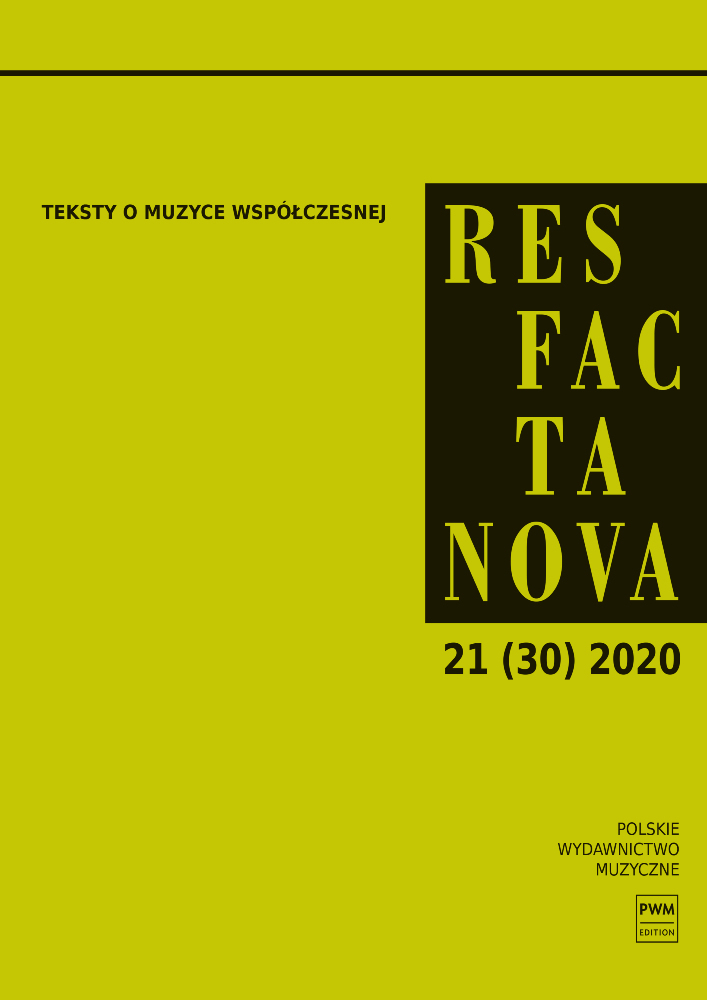Abstrakt
New Music developed in the twentieth century under the influence of Theodor W. Adorno’s philosophy. Its sense, according to the philosopher, lies in social criticism, which the composer accomplishes through radical artistic innovation, and the distance from the audience’s expectations. The sensual pleasure of sound reception is not included in the concept of New Music, which preferably should not appeal to anybody, as it “took on the shoulders darkness of the world and all its guilt, and sees its only happiness in knowing misery” (Adorno).
In the ASMR series, the German composer Neo Hülcker breaks this paradigm of perception and proposes a radically different interpretation
of New Music.
ASMR, or Autonomous Sensory Meridian Response, is a sensation of pleasant tingle, caused by subtle acoustic-haptic phenomena, such as amplified murmurs, whispers, touching objects and materials. Millions of people around the world are watching ASMR videos on YouTube that let them relax nicely.
In such video compositions as ASMR Tutorial: How to Play “Pression” by Helmut Lachenmann, ASMR Tutorial: How to Play Mark Andre
or ASMR Unwrapping the Piano & iv 11a, and Peter Ablinger: weiss/ weisslich 3 – [super soft ASMR] Neo Hülcker investigates the similarity
of sound material of illustrative pieces of New Music and ASMR, raising the question of whether New Music can make someone feel
tingly. Presenting in the context of ASMR works by Helmut Lachenmann, Mark Andre and Peter Ablinger, Hülcker explores the hidden
potential contained in the most radical aesthetics of New Music, namely the suppressed carnal pleasure. The article is an attempt to show the ways how Neo Hülcker redefines the concept of New Music, entering in it the sensual experience of sound.
Bibliografia
Ablinger Peter, [polskie teksty], https://ablinger.mur.at/txt_polski.html (23.03.2020).
Adorno Theodor W., Dialektyka negatywna, przeł. Krystyna Krzemieniowa, PWN, Warszawa 1986.
Adorno Theodor W., Filozofia nowej muzyki, przeł. Fryderyka Wayda, PIW, Warszawa 1974.
Adorno Theodor W., Teoria estetyczna, przeł. Krystyna Krzemieniowa, PWN, Warszawa 1994.
ASMR University, https://asmruniversity.com/history-of-a-smr/ (16.10.2019).
Barratt Emma L., Davis Nick J., Autonomous Sensory Meridian Response (ASMR): a Flow-like Mental State, „PeerJ” 26.03.2015, t. 3, https://www.ncbi.nlm.nih.gov/pmc/articles/PMC4380153/ (23.03.2020).
Brown Jeffrey A., Interview with Mark Andre, „VAN Magazine” 7.06.2017, https://van-us.atavist.com/mark-andre-interview (21.03.2019).
Etchells Pete, ASMR and ‘Head Orgasms’: What’s the Science behind It?, „The Guardian” 20.01.2016, https://www.theguardian.com/science/head-quarters/2016/jan/08/asmr-and-head-orgasms-whats-the-science-behind-it (23.03.2020).
Frank Patrick, Negation, Affirmation, Hyperaffirmation. Zum Stand aktueller Kritik, „Neue Zeitschrift für Musik” 2016 nr 5, s. 16–20. https://www.academia.edu/40384336/Negation_Affirmation_Hyperaffirmation (22.08.2020).
Hülcker Neo, komentarz do utworu ASMR Contemporary Music Ensemble [Tapping] [Scratching] [Brushing] [Whispering], książka programowa festiwalu „Warszawska Jesień” 2017, http://www.warszawska-jesien.art.pl/wj2017/program-i-bilety-2017/utwory/1145106598 (23.03.2019).
Lachenmann Helmut, Musik als existentielle Erfahrung. Schriften 1966–1995, red. Josef Häusler, Breitkopf & Härtel, Wiesbaden 2004.
Lehmann Harry, Muzyka konceptualna jako katalizator zwrotu treściowo-estetycznego w nowej muzyce, przeł. Tomasz Biernacki, Monika Pasiecznik, Piotr Jan Wojciechowski, Monika Zamięcka, „Glissando” 2013 t. 22, s. 89–105.
Lehmann Harry, Rewolucja cyfrowa w muzyce. Filozofia muzyki, przeł. Monika Pasiecznik, Fundacja Bęc Zmiana, Warszawa 2016.
Lochte Bryson C., Guillory Sean A., Richard Craig A.H., Kelley William M., An fMRI Investigation of the Neural Correlates Underlying the Autonomous Sensory Meridian Response (ASMR), „BioImpacts : BI” 2018 t. 8, nr 4, https://www.ncbi.nlm.nih.gov/pmc/articles/PMC6209833/ (23.03.2020).
Mead Andrew, One Man’s Signal Is Another Man’s Noise: Personal Encounters with Post-Tonal Music, [w:] The Pleasure of Modernist Music. Listening, Meaning, Intention, Ideology, red. Arved Ashby, University of Rochester Press, Rochester 2004.
„Musik-Konzepte. Neue Folge”, Heft 167: Mark Andre, red. Ulrich Tadday, München 2015.
Pasiecznik Monika, Muzyka atonalna jest dla wszystkich, „Notes na 6 tygodni” 2018 t. 121, https://www.nn6t.pl/2018/12/15/muzyka-atonalna-jest-dla-wszystkich/ (30.12.2019).
Pasiecznik Monika, Porno Adorno, „Didaskalia” 2014 t. 123, s. 96–99, http://archiwum.didaskalia.p/123_pasiecznik. htm (22.08.2020).
Pasiecznik Monika, Wyjść od szumu i wyodrębnić jego kształty. Wywiad z Peterem Ablingerem, „Ruch Muzyczny” 2009 nr 2, https://pasiecznik.wordpress.com/?s=ablinger (23.03.2020).
Shusterman Richard, Come Back to Pleasure, 2010, “Naked Punch”, http://www.nakedpunch.com/articles/59(26.03.2019).
Spinola Julia, Das musikalische Jenseits. Der Komponist Mark Andre, „Die Zeit“ 8.03.2014, https://www.zeit.de/2014/10/ komponist-mark-andre (21.04.2019).
Linki do stron internetowych oraz do utworów
Neo Hülckera:
https://www.neohuelcker.de/ (26.03.2019).
https://www.youtube.com/watch?v=_goBmCmDVo0 (26.03.2019).
https://www.youtube.com/channel/UC2uSyRU9XHgSpr4e-As19UPA (26.03.2019).
https://www.youtube.com/channel/UCG2RtQL6Y3KVuIOwy5Z9R2g (26.03.2019).
https://www.asmryourself.com/ (26.03.2019).
https://asmruniversity.com/history-of-asmr/ (16.10.2019).

